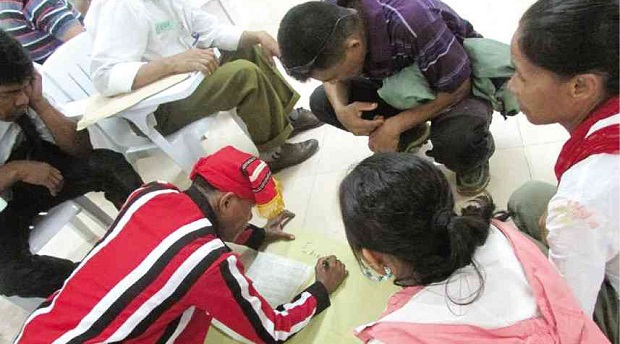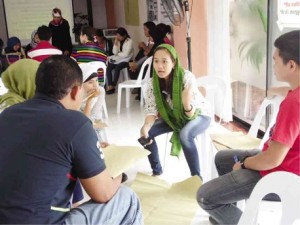
HIGAONON tribal leaders document the discussions on indigenous peoples’ rights during public consultations on the Bangsamoro Basic Law in Iligan City. PHOTO FROM PAILIG ACADEMY FOR GRASSROOTS DEMOCRACY
ILIGAN CITY—Returning from a campaign sortie during last year’s midterm polls, supporters, mostly relatives, of lawyer Abdul Malik Manamparan, who was seeking the vice mayoral post of Nunungan town, Lanao del Norte province, were ambushed. Twelve people were killed and eight were wounded.
Manamparan lost a daughter in the attack, which he believed stemmed from an internecine conflict, locally known as “rido,” made more complicated by his candidacy for a lower post after serving as Nunungan mayor. He had anointed his son to replace him as local chief executive.
Seven months later, the tragedy— one of the country’s worst poll-related violence incidents in 2013— was still fresh in the minds of Lanao del Norte residents when they were asked how they would want the future Bangsamoro government to matter in their lives, whether they became its constituents or not.
During public consultations on the Bangsamoro Basic Law last month, Moro and non-Moro people alike said the new autonomous entity should address the lingering problem of rido in many of the communities in the province.
The meetings, in 13 clusters and conducted by the Lanao Peace Partnership on behalf of the Bangsamoro Transition Commission with the support from the GIZ Civil Peace Service, solicited grass-roots ideas that should be part of the charter of the Bangsamoro government. These attracted over a thousand people in 21 of the 22 towns and in 44 barangays of Iligan City.

MARANAO youth participate in public consultations on the Bangsamoro Basic Law in Iligan City, Lanao del Norte province. PHOTO FROM PAILIG ACADEMY FOR GRASSROOTS DEMOCRACY
Most common concern
According to Gimaidee Ann Cadotdot of Pailig Academy for Grassroots Democracy, rido was the most common concern that cropped up during the consultations, even surpassing the issue of poverty.
Based on discussions of the community experiences, the unresolved enmities weighed down economic development efforts.
The participants pointed out that because of rido, many croplands had been left idle, as the farmers didn’t feel they were safe from being targets of revenge attacks. Apart from the killings, properties and belongings had been burned and destroyed.
To settle the conflict, families have been forced to sell their land and other assets to raise funds for blood money.
Although their communities may not be included in the Bangsamoro, the participants from coastal towns were as concerned with rido as those in core territory. (The municipalities of Baloi, Pantar, Tagoloan, Munai, Tangcal and Nunungan are included in the core territory.)
They stressed that much of the rido-related violent incidents had occurred in their communities, especially those in centers of trading activities.
Rido anatomy
While rido or its equivalent has been observed in other parts of the country, academician Abhoud Syed Lingga of the Institute for Bangsamoro Studies said it was more pronounced in Moro communities.
Rido is related to the Moro people’s deep sense of personal pride and honor, what is referred to in Maranao as “maratabat.” If this sense of honor is violated, parties can engage in fits of violence to assuage the psychological hurt.
A 2005 study commissioned by the Asia Foundation showed that a feud could start even from minor matters. Those that turn bloody and protracted arise from disputes over land and political rivalry.
Rarely are the cases related to litigations in civil courts, which are still culturally alien to many ordinary Moros.
Rather, these trigger a cycle of vengeful attacks that stop only when settled, usually by traditional leaders wielding influence over the protagonists.
Suggested measures
Asked to suggest measures to deal with rido, the participants in the public consultation meetings from communities where the presence of Moro rebels is strong, hoped the Moro Islamic Liberation Front (MILF) would rein in its forces from joining revenge attacks.
Most MILF forces, they observed, had a hard time keeping distance from the rido of relatives.
Another suggestion was to expand the coverage of the Shari’ah justice system to include criminal cases.
According to former Moro rebel leader Lacsamana Mutia, prescribing degrees of punishment under a justice system consistent with their cultural moorings would serve as deterrents to Muslim Bangsamoro constituents from committing acts of violence against other persons.
Still another idea was to build the capacity of governance structures—from the barangay up—to undertake dialogues. If the parties are brought into a dialogue to thresh out differences, rido may be arrested, the participants said.
Plural system of justice
The future Bangsamoro political entity is expected to feature “a plural system for the administration of justice,” as characterized by the government’s chief negotiator, Miriam Coronel-Ferrer, in peace talks with the MILF. Ferrer is a political science professor of the University of the Philippines.
Under the framework agreement on the Bangsamoro—which will become part of an upcoming comprehensive peace agreement with the MILF and eventually guide the drafting of the basic law—the new autonomous entity shall have justice institutions for Muslims with the Shari’ah, indigenous peoples with their customary laws, and non-Moro and nonindigenous peoples through the improved working of civil courts.
The Bangsamoro is expected to have competence over the Shari’ah justice system as well as to institutionalize alternative dispute resolution systems, such as those of indigenous communities.
Apart from professing the Islamic faith, Maranaos, for instance, will continue to be guided by the “taritib,” which defines customary rights, privileges and obligations, in conflict resolution. Such a process is overseen by traditional clan-based leaders.
Although primarily resorted to by the Maranaos in settling rido, this is not currently part of the legally mandated method of dispute resolution.

